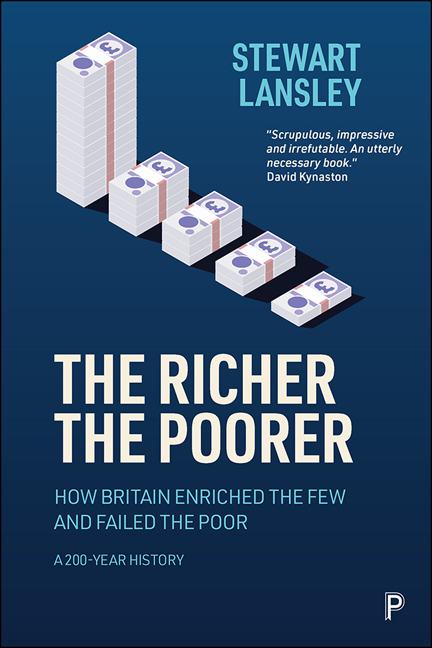Book contents
- Frontmatter
- Miscellaneous Frontmatter
- Dedication
- Epigraph
- Contents
- List of figures
- Preface and acknowledgements
- Introduction: Knighthoods for the rich, penalties for the poor
- PART I 1800–1939
- PART II 1940–59
- PART III 1960–79
- PART IV 1980–96
- PART V 1997–2010
- PART VI 2011–20
- Afterword: COVID-19 and ‘the polo season’
- Notes
- Index
4 - A roller-coaster ride
Published online by Cambridge University Press: 13 May 2022
- Frontmatter
- Miscellaneous Frontmatter
- Dedication
- Epigraph
- Contents
- List of figures
- Preface and acknowledgements
- Introduction: Knighthoods for the rich, penalties for the poor
- PART I 1800–1939
- PART II 1940–59
- PART III 1960–79
- PART IV 1980–96
- PART V 1997–2010
- PART VI 2011–20
- Afterword: COVID-19 and ‘the polo season’
- Notes
- Index
Summary
Despite a short-lived boom, the early post-war years brought economic turbulence and recession. There was not a single year from 1921 to 1938 when the dole queue fell below one million. With large numbers of exserviceman still unemployed eighteen months after the war and in an ‘ugly mood’, and establishment and middle class fears of the spread of Bolshevism, the cabinet was warned repeatedly of the risk of unrest.
In January 1919, sixty thousand strikers in Glasgow, many wearing their war medals, clashed with police, with a panicked London cabinet sending in troops. Marches against unemployment were also broken up, often with violence, by foot and mounted police. A central issue in Glasgow was the length of the working week, with demobbed soldiers calling for shorter hours so that work could be shared. Strikers claimed that manufacturers wanted to maintain a local pool –‘a reserve army’ –of obedient available labour. The strikers had some success, while one of the organisers –the seaman's leader, Manny Shinwell, later a member of Clement Attlee's 1945 cabinet –was jailed for five months for inciting riot. The ‘Red Clydesiders’, as the strikers became known, won ten out of fifteen Glasgow constituencies for the Independent Labour Party in the 1922 general election.
The War and its sacrifices raised expectations about the obligations of the state to wider society. While Lloyd George formed a coalition government in 1919, the new parliament was light on members committed to social reform, with an influx of ‘new money’ businessmen (they were all men) committed to the status quo. They included sixty-one insurance directors, 138 manufacturers, 115 landowners and twenty-eight bankers. ‘A lot of hard faced men who look as if they had done very well out of the war’, is how Stanley Baldwin, a moderately wealthy Worcestershire ironmaster and the new financial secretary to the treasury, famously described the new House of Commons. Baldwin, who became prime minister on three separate occasions, donated a fifth of his firm's profits towards paying off Britain's War Debt a move that was far from widely followed.
- Type
- Chapter
- Information
- The Richer, the PoorerHow Britain Enriched the Few and Failed the Poor: A 200-Year History, pp. 36 - 48Publisher: Bristol University PressPrint publication year: 2021



